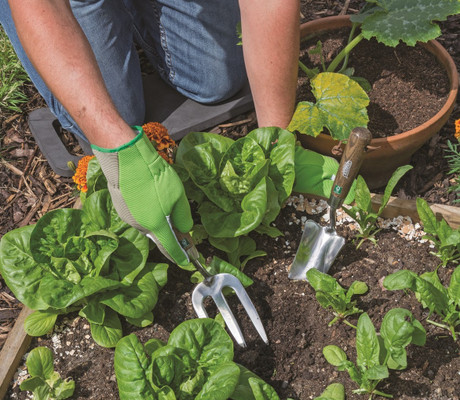Embracing Organic September in the garden
31st Aug 2022

Today sees the start of Organic September, run by the Soil Association to raise awareness of the “many benefits of organic food and farming”.
Food on the supermarket shelves has to meet stringent criteria before it can be labelled ‘organic’. Strict regulations cover farming and food production, such as banning the use of chemical weedkillers, additives and colouring. Organic farmers and food producers must be registered with a control body and inspected annually.
But it’s easy to ‘go green’ at home. You can do as much or as little on the path to ‘organic’ as you choose, and it can even cut costs, if you’re ditching shop-bought and chemical products, for example.
Nature-friendly, home-grown fruit and veg
One of the main aims of organic farming is to produce food “as it should be”, with all its natural, nutritional benefits and taste.
And what can possibly taste better than when eating raspberries picked straight from the cane, potatoes dug fresh from the soil, peas carried garden-to-kitchen ready to pod – and knowing they’ve been grown naturally without taint from chemicals?
If you’re new to ‘green’ vegetable gardening, we’ve a wide range of garden hoes that will help with weeding, and if you’re making your own natural pesticides various spray bottles to choose from.
Feeding the soil naturally
Good, healthy soil is essential for organic gardening.
Soil needs vital nutrients and texture to be able to grow healthy vegetables and fruit.
Using home-made compost is a simple, easy, cost-effective and extremely green way to feed and improve your soil. Earlier in the year, we put together a blogcovering all you need to know to get started with composting.
Leaf mould is also an excellent mulch, and our dry summer with its worst drought for almost 50 years has seen leaves falling far earlier in the year than usual. Experts advise that collecting up fallen leaves is best done regularly and often, and to help we’ve various rakes, leaf collectors, blowers and grabbers from which to choose.
Wildflowers
‘Organic’ is very much about the environment and supporting biodiversity and wildlife, and one of the most popular ways in which many people are looking to do this is by setting aside an area of the garden for wildflowers. This not only creates an environment to support the insects that are vital to the ecosystem, but cuts down on the need for invasive gardening and use of chemicals.
And these areas don’t need to be large. Tubs on balconies or courtyard patios, or small corners of gardens can become havens for wildlife, will help make a difference for the planet – and look stunning.
Starting small, or aiming big
Whether you’re starting out or well on the path to organic fruit and veg gardening, it’s all about creating that better taste, helping in the fight against climate change, and supporting the environment. It can also be cost-effective, whether you’re moving from using shop-bought chemical products or turning ‘refuse’ (kitchen scraps, leaves and other garden waste) into valuable, environmentally healthy compost and mulch.
Plus, gardening is a great workout!